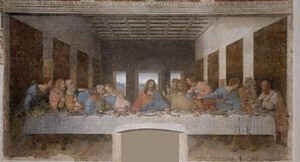28th Sunday in Ordinary Time (Mt 22:1-14)

DaVinci – The Last Supper
And the second is that Jesus always enjoyed a good party. Besides attending feasts and meals during his ministry, he often spoke of the kingdom of God as a feast or a banquet. Let’s face it, Jesus really knows how to keep a party going—and it’s not with extra pans of chicken cordon bleu and vats of rubbery green beans.
But in reality a banquet or feast is actually a rather good analogy. The Kingdom of God is like a great party; one that will be talked about for all eternity because it will go on for all eternity. And the best part is that all are invited; everyone, absolutely everyone. But—and there is always a but isn’t there—that doesn’t mean that anything goes.
While the invitation into the Kingdom is open to everyone, we must prepare ourselves in order to attend the feast. We do this by putting on our “wedding garment” or in St Paul’s words, we put on Christ – we clothe ourselves in love – in gentleness – in all that is worthy of the Kingdom. We need to prepare ourselves, not because we must but because we know we are entering into the presence of a loving, gracious, and forgiving God.
When we are Christian in name only, or when we adopt a stance we call Christian that overlooks justice and hospitality toward others, we are depriving the world of Christ’s influence through us. We are also depriving ourselves of the opportunity to change our own lives. A culture of cynicism and emphasis on form rather than substance encourages a weak response rather than a strong commitment. Jesus did not make light of people and their concerns, but poured out his life, both ultimately and on a daily basis, as he listened, healed, taught and loved people, both friends and strangers. God created us with equal dignity, and he expects us to treat others in the same way. How we respond to his expectations measures the quality of our faith.
What is our attitude when we say, each Sunday, in the Creed: “I look for the resurrection of the dead and the life of the world to come”? We are called to believe this with all our heart, but do we really do so? Are we not often strongly attached to the things of this world, perhaps even to the point of partially denying our faith? Think of the guests in the parable; each had an excuse for not attending; all were held back by some worldly reason that kept them from the kingdom of heaven. Each Sunday we proclaim our faith in Christ, but do we really long for him with all our heart.
As God calls us all to himself, he gives us the power to respond. That power is faith, to trust in God and assent to his truth. In this sense, “faith is a gift from God, a supernatural virtue infused by him“. Faith is grace. In other words, we can describe faith as God’s love reaching out to us and his love in us reaching back to him. Without God’s initiative of love, we could not know God or have a relationship with him.
As love is freely given, it is freely received. As a free acceptance of God’s love, faith is truly a human act, for God does not impose love on us. Faith is a supremely free act that God gives us. He reaches out to us with love, and his love carries us back to him. God calls us all with his love. His chosen are those of us who freely say “yes” and faith is our simple “Yes” to that love. While God’s love might seem faint or absent at times, he still points us toward our ultimate destination, life eternal with him. Faith is our road to eternal life.
The Feast that God prepares for us is like a test that is set before us: we must believe that the Feast is true, we must hope for this Feast as the single motive of all our desires, we must love this Feast as that which will give us the most succulent dishes for our soul and our body. We must above all show that we are worthy of being admitted to this Feast: we must have total confidence in God.
Jesus affirms the boundless generosity and inclusive reach of God’s grace, but he also tells us that for us to be “worthy” of God’s gift requires nothing less than for us to give our whole life to the glory of God.
